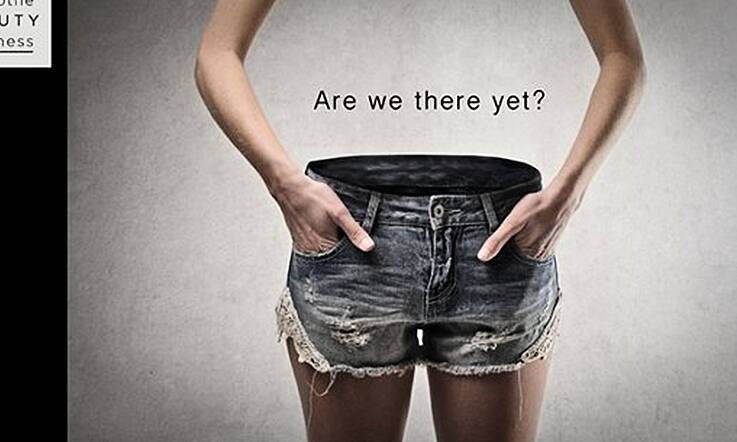#StoptheBeautyMadness: Brutally Honest, Witty Campaign Goes Viral

Even die-hard beauty product lovers (which includes most of us here, I suspect) will admit that these days, our society has a pretty screwed up attitude towards women and their appearance. Women should be doing what they want to do for themselves, not what is demanded of them by a peer pressure-driven stereotype.
It's hard to argue that in the 21st century there isn't more general pressure on women – and, increasingly, girls – to appear slim and professionally groomed, and that female body image has become increasingly warped through everything from Photoshopped ads to porn culture.
But a new campaign called Stop the Beauty Madness is trying to redress the balance with twenty five ads that highlight the unhealthy, racially loaded messages sent out by both the beauty industry and the media in general, using stock photos that regularly appear as illustrations in magazines and websites. An image of a prepubescent girl pouting in sophisticated make-up is captioned "I don't even like boys yet"; a picture of a beautiful young black woman is captioned "Smart enough. Talented Enough. Not white enough #didnotgetthejob".
On the Stop the Beauty Madness website, the campaign's vision is clear.
Welcome to a new world - one we are creating right here and right now. In this new world, our beauty is defined by whole-self qualities, not eye-to-nose and bust-to-waist-to-hip ratios. In this world, we KNOW we are more than our appearance, our size and our shape. In this world, we are throwing off our role as sales-hypnotized consumers and getting on with the task of changing the world.
Now more than ever this world needs us to stop shrinking behind ideas that are too small for us.
So we are here in mass to disturb the peace in beautiful, powerful ways. We are here to create a new culture around beauty. We are here to save ourselves and our children from our own childish and destructive obsessions. We are here to stand tall, AS IS, and get on with our lives.
Advertisement
Stop the Beauty Madness is the brainchild of a woman called Robin Rice, who describes herself thus on the site:
Robin Rice is the Creative Director of the Stop The Beauty Madness campaign and President of our sponsor company, Be Who You Are Productions, Inc. Robin is a mentor to world-level leaders through Rainmaker Consulting, "changing the lives of people who are changing the world." She is an internationally published author (if you love this website, you will love her novel Venus For A Day) and a self-proclaimed Social Change Artist. She offers a yearly 9-month apprenticeship in mentoring the soul at HealingWithPresenceAndBeauty.com.
Hmmmm. The site also offers Robin's free Stop the Beauty Madness audio series (a podcast, basically), which launches on July 28th. Now, I have to admit phrases like "self-proclaimed social change artist" make me roll my eyes so much I'm worried I'll lose a contact lens (leading me to believe that I will not actually love Robin's novel Venus for A Day).
But it is hard to argue with the spirit behind the campaign. Refreshingly, the campaign doesn't present any sort of body type as a "real woman" or " real beauty"; it criticises stereotypes of thin women and muscular women as well as negative images of larger women. In a Huffington Post interview, Rice said that
"Naturally thin women, or women who choose to work out and have really buff bodies, or elderly women, are not excluded from this conversation. They get their own backlash...We look at beauty magazines and fashion photographs and whether we theoretically believe in them or not, we've seen so many of them and they've been put into exactly the right light and ratio that something inside of us has said 'That's beautiful.' Whether or not we believe in it intellectually, something deeper has set in and we compare ourselves to that.
So what do you think of the campaign? Is it patronising or is it addressing a real and important issue? And what do you think is the best way to challenge beauty stereotypes?
(All images via http://www.stopthebeautymadness.com)